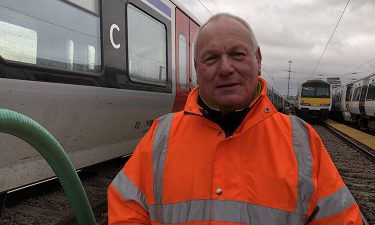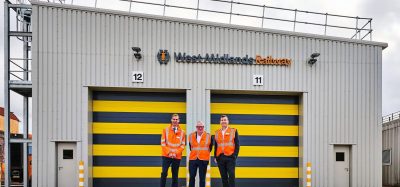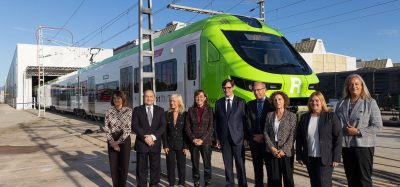Rail’s COVID-19 Heroes – Greater Anglia
Posted: 15 April 2021 | Greater Anglia | No comments yet
In the next instalment of Global Railway Review’s exclusive series, Greater Anglia reflects on 2020 and the impact of the pandemic on its business, as well as highlighting three employees who have dedicated the last 12 months to keeping passengers safe, informed and moving.


The pandemic has presented challenges to everyone, globally. We’ve all had to come to grips with a different way of living: home schooling, working from home, queuing for supermarkets, socially distancing and staying at home more than ever before, especially if you or a family member are shielding.
COVID-19 has had a huge impact on Britain’s railway. Passenger numbers plummeted within days of the first lockdown in March 2020. Fortunately, the government stepped in and set up emergency management arrangements with most train operating companies, including Greater Anglia, which meant that they could continue providing a vital service to allow essential travellers to make journeys to work, or for medical appointments, and safeguarded the railway for the future.
In the last 12 months, Greater Anglia has reacted agilely to frequent changes. There have been eight timetable changes; frequent adaptations of travel messaging depending on what restrictions or tiers were in place; and rising and falling passenger numbers. The one constant has been the need to provide a safe and reliable service for customers. Rail passengers need to be reassured that they are using trains and stations which have been cleaned and sanitised and that they can easily socially distance on trains and at stations.
Throughout the pandemic, all of Greater Anglia’s teams have continued to work. No-one was furloughed. Some roles changed – catering staff pitched in to step up cleaning at stations, and the retail systems team was deployed to help process 55,000 refunds as commuters followed government guidelines to work from home.
Major transformation projects continued. Greater Anglia is replacing every single train in its fleet with brand new trains. In 2020, the company replaced all of its old intercity and Stansted Express airport trains with brand new trains, as well as completing the roll-out of bi-mode trains, which run on diesel and electricity, on its regional routes, to replace all of its old diesel trains. In November and December 2020, the first of its new electric commuter trains built by Bombardier (now Alstom) were put into passenger service in Essex.
Schemes to improve stations also continued, including upgrades for waiting rooms and a major technology upgrade to improve connectivity and communications at stations, replacing old equipment and installing brand new, state-of-the art information screens and CCTV cameras at 132 of its 133 stations.
It’s difficult to single out Greater Anglia staff to highlight, as each and every one across all grades, roles and locations has done a fantastic job in keeping the railway working, but here is a selection of three behind-the-scenes roles which have made a big difference to rail passengers during this difficult time.
Keith Palmer – Head of Performance and Planning


Keith Palmer – Greater Anglia’s Head of Performance and Planning.
Keith oversees Greater Anglia’s train planning team, which, since March 2020, has had to draw up eight new timetables, as services have been revised in line with lockdowns, tier systems and changing government guidance about using public transport. Revising a train timetable is a major logistical exercise, and it normally takes a full year to plan a new timetable. Keith’s team of 15 train planners have had to consider many additional factors due to COVID-19, such as: planning for potentially increased staff absences in key roles like drivers and conductors due to the virus; the need to reduce services whilst still ensuring key workers could get to work; and, at the same time, running enough trains to avoid overcrowding and maintain social distancing. All the while, like everyone else, the team was grappling with the new challenges of working from home whilst juggling childcare and home schooling.
Reflecting on the past 12 months, Keith said: “The first week was full on. Usually, emergency timetables are implemented through Control arrangements – during major disruption, the Control Room will put in a temporary timetable to cope with that specific situation. But we couldn’t do that this time. We had to go back to the drawing board and start from a blank sheet of paper for the whole network.”
In a normal year, the timetable is changed in December and May. Keith’s team have also written those timetables, as well as looking ahead to any major timetable changes in December 2021.
“The normal timetable sits behind our revised timetable, which it makes it a little easier to increase services where necessary, as we did in July 2020, when just under 93 per cent of services were reinstated. Since then, we’ve made further revisions, including reducing it in January 2021 for the most recent lockdown, basing it loosely on a Saturday service. I can’t fault the way that my team has risen to the challenge in the last year, putting in many extra hours to create new timetables as requested.”
Ela Hawran Beaumont – Senior Marketing Manager


Ela Hawran Beaumont – Senior Marketing Manager at Greater Anglia.
While the pandemic has been a quiet time for traditional marketing – instead of encouraging people to travel, Greater Anglia has spent a great deal of the last 12 months asking people to stay at home and avoid public transport in line with government guidance – Ela, a senior member of Greater Anglia’s small marketing team, has been far from twiddling her thumbs. Ela oversees Greater Anglia’s website and app and is responsible for co-ordinating the many departments who use it to post vital information for customers.
Since March 2020, travel advice has regularly changed in line with government guidance during lockdowns, national restrictions and tier systems – which, at one point, saw Greater Anglia’s network split into two different tiers, with different travel advice for both. It has been vital that information about travel advice, revised timetables, changing ticket office opening hours and how to claim refunds was up-to-date and easy to reach. Transport Focus and the Department for Transport (DfT) have been carrying out regular audits to make sure that Greater Anglia – and other train operators – are doing the best job possible for their customers with their websites.
Ela said: “There is so much information on our website – we direct our customers to it to find out everything that they need to know for their journeys. In normal times, I would be making sure that special offers and discounted fares were most prominent. But, for the last year, I’ve wanted to make sure that customers can get details of all the changes that we’ve made because of the pandemic, with a minimum number of clicks. They want to see revised train times, whether their ticket office is open and what we’re doing to keep them safe – reassurance is a very big element of our marketing at the moment.”
“In March 2020, I was involved in rapidly setting up new systems for customers to get refunds on their season tickets and other tickets – and I had to make sure that these new processes were easy to access from the website, which was a huge piece of work. I’ve lost count of how many updates we’ve made to different pages on the website to make sure that all of the information is up-to-date and easy to understand. The audits have acted as a useful checklist to make sure we get it right for our customers,” she added.
Ela concluded: “Before the current lockdown, we ran a reassurance TV ad campaign, building on the print and digital messages of reassurance, and we’re still trying to plan marketing campaigns which were postponed from 2020. We’ve got brand new trains and, as soon as the time is right, we want to promote them.”
Peter Tyler – Head of Train Presentation


Peter Tyler – Greater Anglia’s Head of Train Presentation
Never before has there been so much emphasis on train cleaning – even all the way down to media enquiries about which particular type of virucide Greater Anglia was using. From the start of the pandemic, government advice has been that the virus can spread on people’s hands – so it was down to Peter’s teams to make sure that all high touch areas on trains and stations were cleaned and sanitised, and that train and station toilets were topped up with soap and water so that customers could easily wash their hands while travelling.
In the last year, Peter expanded his team by nearly 10 per cent, and has bought new powerful equipment to keep trains clean and sanitised. In total, Greater Anglia has spent £600,000 on new cleaning measures, extra cleaning routines, new and additional detergents and more staff. New equipment includes seven fogging guns used to spray a fine targeted mist of anti-viral disinfectant, which quickly kills off bacteria and viruses in the air, on floors, furniture, walls, ceilings, other surfaces and large internal areas. They also have eight Pacvac powerful backpack vacuum cleaners, fitted with four filters which clean the air as well as the floor and upholstery – especially useful for ‘turnaround cleaning’ of trains at stations between arriving on one service and departing again on the next one.
Having instituted new cleaning regimes, Peter was keen to check that they were as efficient and effective as possible, so bought five hygiene monitoring units which are used weekly to quickly detect biological residue on high touch areas on board trains. Peter has also commissioned an independent company to test for COVID-19 on high touch areas of Greater Anglia trains – which have all come back negative.
Peter said: “Cleaning has come under a huge amount of scrutiny in the last 12 months. Some passengers are nervous about travelling and they want to be sure that we’re doing everything that we can to keep them safe. I’m very proud of my team, who have worked tirelessly to keep our trains clean and sanitised. I’ve been following all developments and innovations in cleaning equipment and detergents to make sure we are using the best equipment that we can. My teams have been working really hard, but we’re not complacent; it’s still very important that our customers feel safe to come back and use our services as we follow the roadmap out of lockdown.”
Stay Connected with Global Railway Review — Subscribe for Free!
Get exclusive access to the latest rail industry insights from Global Railway Review — all tailored to your interests.
✅ Expert-Led Webinars – Gain insights from global industry leaders
✅ Weekly News & Reports – Rail project updates, thought leadership, and exclusive interviews
✅ Partner Innovations – Discover cutting-edge rail technologies
✅ Print/Digital Magazine – Enjoy two in-depth issues per year, packed with expert content
Choose the updates that matter most to you. Sign up now to stay informed, inspired, and connected — all for free!
Thank you for being part of our community. Let’s keep shaping the future of rail together!
Related topics
Airport Rail Links, Apps, Coronavirus/COVID-19, Funding & Finance, Operational Performance, Passenger Experience/Satisfaction, Rolling Stock Orders/Developments, Safety, The Workforce
Related organisations
Department for Transport (DfT), Greater Anglia, Transport Focus







